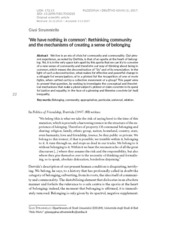Приказ основних података о документу
We have nothing in common: Rethinking community and the mechanisms of creating a sense of belonging
| dc.creator | Strummiello, Giusi | |
| dc.date.accessioned | 2018-02-20T12:55:27Z | |
| dc.date.available | 2018-02-20T12:55:27Z | |
| dc.date.issued | 2017 | |
| dc.identifier.issn | 0353-5738 | |
| dc.identifier.uri | http://journal.instifdt.bg.ac.rs/index.php?journal=fid&page=article&op=view&path%5B%5D=499&path%5B%5D=472 | |
| dc.identifier.uri | http://rifdt.instifdt.bg.ac.rs/123456789/1459 | |
| dc.description.abstract | We live in an era of crisis for community and commonality. Our pres-ent experience, as noted by Derrida, is that of an aporia at the heart of belong-ing. Yet, it is in the very space torn apart by this aporia that we can try to conceive of a new sense of community and transform our way of thinking about being in common, which means the deconstruction of “Us” and of its enunciation. In the light of such a deconstruction, what makes for effective and powerful change in a struggle for emancipation, or in a protest for the recognition of one or more rights, when carried out by a collective movement or a group? This paper aims to answer that question, by seeking to investigate the conceptual and theoret-ical mechanisms that make a plural subject’s protest or claim concrete in its quest for justice and equality, in the face of a growing and likewise concrete (or real) inequality | en |
| dc.description.abstract | Živimo u dobu krize zajednice i zajedničkog. Naše sadašnje iskustvo, kako je to primetio Derida, jeste iskustvo aporie u srcu pripadanja. no, svejedno, upravo u prostoru koji je ova aporija razjedinila možemo pokušati da začnemo novi osećaj zajednice i transformišemo način na koji mislimo o bivanju zajedno, što pretpo-stavlja dekonstrukiciju „Mi“ i „Mi-govora.“ Ali, u svetlu takve dekonstrukcije, šta bi bila efektna i moćna promena koju bi doneo neki kolektivni pokret ili neka grupa koja se bori za emancipaciju ili protestuje zarad priznanja prava? Ovaj rad stremi odgovoru na to pitanje pokušajem da se istraže pojmovni i teorijski me-hanizmi koji konkretizuju protest ili zahtev pluralnog subjekta u njegovoj potra-zi za pravdom i jednakošću, nasuprot rastućoj i, takođe, konkretnoj (ili realnoj) nejednakosti. | sr |
| dc.language.iso | en | sr |
| dc.publisher | Beograd : Institut za filozofiju i društvenu teoriju | sr |
| dc.rights | openAccess | sr |
| dc.rights.uri | https://creativecommons.org/licenses/by-nc-nd/4.0/ | |
| dc.source | Filozofija i društvo/Philosophy and Society | sr |
| dc.subject | belonging | sr |
| dc.subject | pripadanje | sr |
| dc.subject | community | sr |
| dc.subject | appropriation | sr |
| dc.subject | particular | sr |
| dc.subject | universal | sr |
| dc.subject | relation | sr |
| dc.subject | zajednica | sr |
| dc.subject | prisvajanje | sr |
| dc.subject | partikularno | sr |
| dc.subject | univerzalno | sr |
| dc.subject | odnos | sr |
| dc.title | We have nothing in common: Rethinking community and the mechanisms of creating a sense of belonging | en |
| dc.type | article | sr |
| dc.rights.license | BY-NC-ND | sr |
| dcterms.abstract | Струммиелло, Гиуси; | |
| dc.citation.issue | 1 | |
| dc.citation.volume | 28 | |
| dc.citation.spage | 22 | |
| dc.citation.epage | 31 | |
| dc.identifier.doi | 10.2298/FID1701022S | |
| dc.type.version | publishedVersion | sr |
| dc.identifier.fulltext | http://rifdt.instifdt.bg.ac.rs/bitstream/id/2894/bitstream_2894.pdf | |
| dc.identifier.wos | 000408375800002 |

